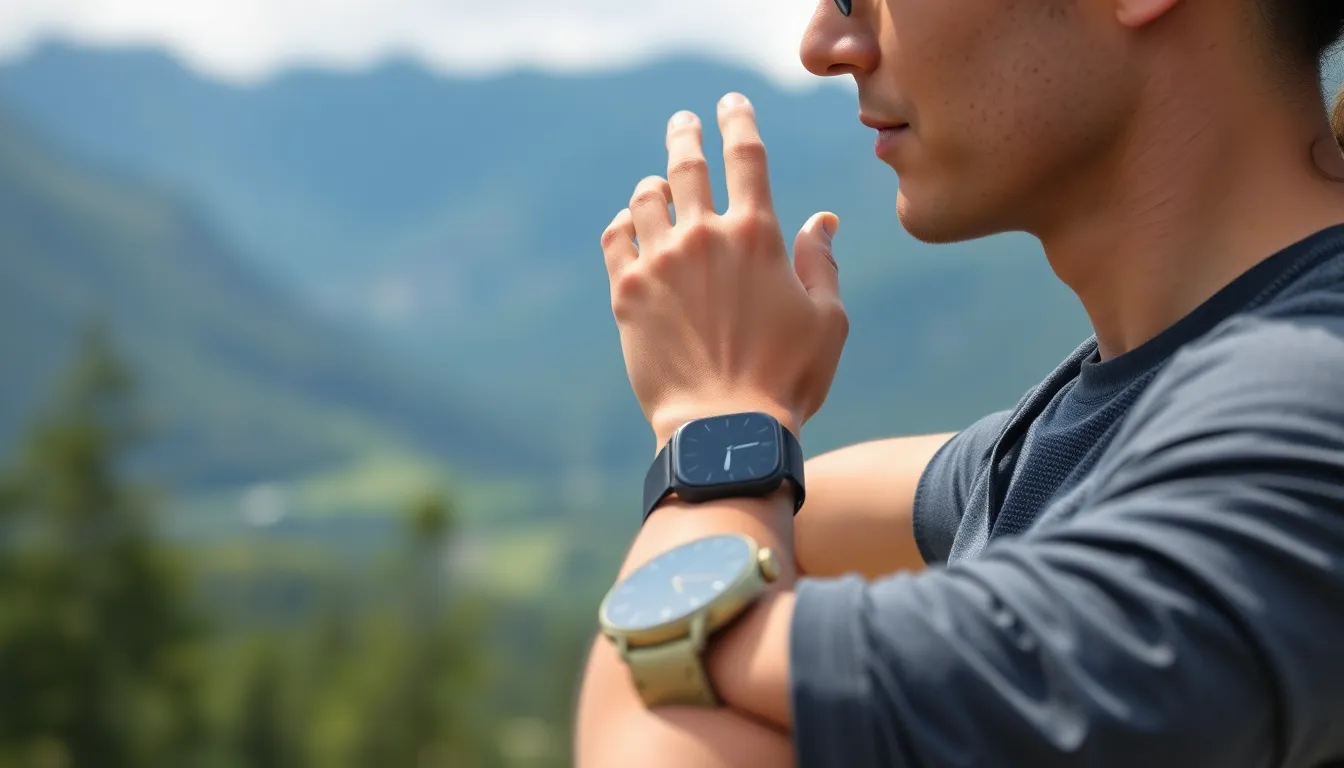In a world where your wrist can track your heart rate, remind you of your meetings, and even tell you when to stand up, wearable tech companies are leading the charge into the future. These innovative brands aren’t just creating gadgets; they’re crafting lifestyle companions that promise to make life a little easier and a lot more interesting.
Table of Contents
ToggleOverview of Wearable Tech Companies
Wearable tech companies focus on creating innovative devices that integrate seamlessly into everyday life. Notable players in this industry include Apple, Fitbit, and Garmin, each offering unique products to meet diverse consumer needs.
Apple leads with its Apple Watch, which combines advanced health tracking features with seamless connectivity to its ecosystem. Fitbit excels in fitness tracking, prioritizing user-friendly interfaces and comprehensive health metrics. Garmin targets outdoor enthusiasts with GPS-enabled devices that track performance in various sports.
Many companies invest in research and development, striving to enhance the capabilities of wearable devices. Innovations include real-time health monitoring, AI-driven insights, and integration with smart home technologies. As the market grows, firms increasingly collaborate with health professionals to ensure their products deliver accurate and useful information.
These companies respond to consumer demand for devices that promote healthier lifestyles while maintaining functionality. Emerging brands also contribute innovative solutions, expanding options for users who seek specialized wearable technology.
Market forecasts indicate steady growth in the wearable tech sector, driven by advancements in materials, sensors, and software. Consumers increasingly prefer devices that not only track health data but also promote a balanced lifestyle, making engagement easier and more meaningful.
Wearable tech companies continue pushing boundaries, exploring new functionalities and applications. They remain central to the ongoing evolution of health and wellness technology, shaping how individuals interact with their health and fitness. As more consumers adopt these technologies, insights gained will drive future innovations and product enhancements.
Key Players in the Market

The wearable tech market features a mix of established brands and emerging startups. These companies shape the landscape with innovative products and solutions.
Established Brands
Apple, Fitbit, and Garmin dominate the wearable tech scene. Apple Watch stands out for its advanced health monitoring capabilities and integration with other Apple devices. Fitbit focuses on accessible fitness tracking with user-friendly interfaces that appeal to health-conscious individuals. Garmin captures the outdoor market with GPS-enabled devices designed for adventurers and athletes. Other notable brands include Samsung, with its Galaxy Wearable line, and Xiaomi, which offers budget-friendly smartwatches. Investment in research and development drives these brands toward continuous innovation, ensuring they remain competitive.
Emerging Startups
Numerous startups are making their mark in the wearable tech sector. Oura Ring provides innovative health tracking through a discreet and stylish ring design. Whoop offers a subscription model that focuses on performance optimization for athletes. Similarly, Moov spans fitness tracking with audio coaching designed for various workouts. These startups leverage cutting-edge technology to deliver unique value to consumers. Many of them emphasize real-time health data, wearable payment solutions, and personal safety features. As new consumers enter the market, the presence of these startups paves the way for fresh ideas and industry advancements.
Innovations and Trends
Wearable technology continues to evolve, showcasing an array of advancements that enhance user experiences and promote healthier lifestyles.
Health and Fitness Wearables
Fitness trackers maintain popularity with features that monitor activity levels, heart rates, and sleep quality. Devices from companies like Fitbit and Garmin cater to fitness enthusiasts by providing insightful data and personalized fitness goals. Advanced sensors track health metrics in real-time, while AI algorithms analyze information to offer actionable insights. More brands are incorporating health features as part of their core offerings, reflecting the growing consumer demand for holistic wellness solutions. Recent developments in smartwatches include ECG monitoring and fall detection, enabling users to maintain a proactive approach to their health.
Smart Fashion and Accessories
Fashion brands increasingly integrate technology into clothing and accessories, creating stylish options that incorporate functionality. Smart rings and clothing offer features like body temperature monitoring and hydration alerts, blending seamlessly into daily life. Companies like Oura and Fit(x) demonstrate innovation by introducing fashionable wearables that appeal to style-conscious consumers. The impact of social media on fashion trends drives demand for unique designs that incorporate tech functionality without compromising aesthetics. Brands remain focused on developing materials that are both lightweight and durable to enhance the user experience further.
Challenges Facing the Industry
Wearable tech companies face several challenges that could impact growth and consumer adoption.
Competition and Market Saturation
Intense competition defines the current landscape. Numerous established brands vie for consumer attention, while startups enter the market at a rapid pace. Apple, Fitbit, and Garmin compete closely with Samsung and Xiaomi as well as new players like Oura Ring and Whoop. Market saturation presents a hurdle as companies struggle to differentiate their products. Unique functionalities become essential for capturing consumer interest. Offering advanced health insights or stylish designs may provide a competitive edge. Balancing innovation and affordability remains crucial. To stand out, companies focus on building brand loyalty through quality performance and user experience.
Privacy and Data Security Concerns
Privacy and data security issues loom large in the wearable tech industry. Devices collect personal health data, raising questions about user consent and data protection. Consumers demand transparency on how their information is handled. Companies must ensure compliance with regulations such as GDPR and HIPAA. Failure to protect user data could result in legal repercussions and damage brand reputation. Addressing these concerns is critical for consumer trust. Companies need to implement robust security measures while educating users on data privacy. Ensuring safety features and clear privacy policies can enhance user confidence in wearable technology.
Future Outlook for Wearable Tech Companies
Growth in the wearable tech sector continues to accelerate, driven by consumer demand for advanced features. Companies are developing devices embedded with innovative technologies, enhancing health monitoring and lifestyle integration. Market forecasts predict an increase in global revenues, expected to reach over $60 billion by 2025.
Emerging startups like Oura Ring, Whoop, and Moov contribute fresh ideas and specialized products. Each startup focuses on unique features such as discreet health tracking and performance optimization. Collaboration with healthcare providers ensures products meet user needs effectively.
Technological advances in materials and sensors enable improved functionality and comfort. Smart clothing and accessories become increasingly popular, incorporating features like hydration alerts and body temperature monitoring. Style remains a priority, appealing to consumers who value both aesthetics and practicality.
Data privacy plays a significant role in shaping consumer trust. Companies must prioritize robust security measures to protect personal data. Regulatory compliance becomes essential as privacy concerns grow among users.
Wearable tech companies increasingly explore partnerships with fitness apps and health platforms, expanding their ecosystem. By enhancing connectivity and functionality through collaborations, companies provide users with more comprehensive health insights.
Competition remains fierce among established brands like Apple, Fitbit, and Garmin, driving innovation. Differentiation through unique functionalities and designs becomes necessary for success. The ability to adapt to trends and respond to consumer feedback shapes the future landscape of wearable technology.
The wearable tech industry is poised for significant growth as companies innovate to meet the evolving needs of consumers. With advancements in health monitoring and stylish designs, these devices are becoming essential lifestyle companions.
As competition intensifies, brands must focus on differentiation through unique features and robust data security measures. The collaboration between established companies and emerging startups is fostering a dynamic environment that promises exciting developments in the future.
With a projected market value exceeding $60 billion by 2025, the potential for wearable technology to enhance health and wellness continues to expand. The journey of wearable tech is just beginning, and the future holds endless possibilities for both consumers and innovators alike.






